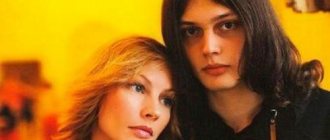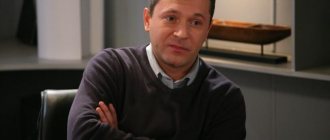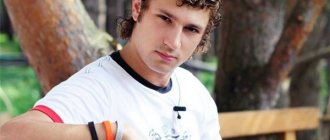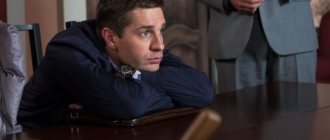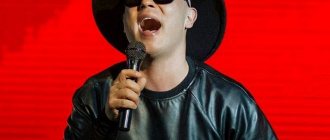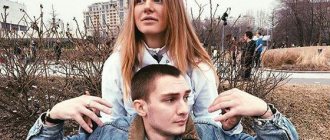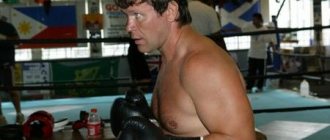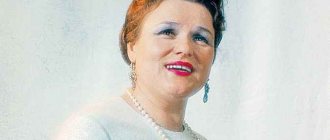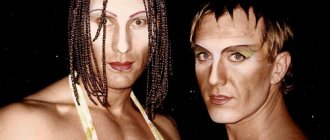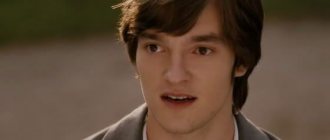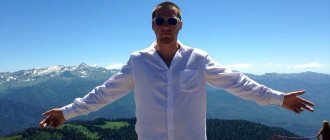Nikita Khrushchev is a Soviet statesman, First Secretary of the CPSU Central Committee, who led the country for 11 years. The only head of the USSR who was forcibly removed from his position during his lifetime.
The period of Khrushchev's rule is often called the “thaw”. His biography has many dark spots and interesting facts, which we will tell you about right now.
So, here is a short biography of Khrushchev .
Biography of Khrushchev
Nikita Sergeevich Khrushchev was born on April 3 (15), 1894 in the village of Kalinovka, Kursk province. He grew up in the family of miner Sergei Nikanorovich and his wife Ksenia Ivanovna.
In addition to Nikita, the Khrushchevs had a girl, Irina. Since the family constantly lacked funds, the boy had to work a lot from his youth.
Childhood and youth
Khrushchev's first educational institution was a parochial school. When summer came, he tended sheep and calves. In 1908, the Khrushchevs moved to Yuzovka, which was later renamed Donetsk (now Ukraine). At that time, the teenager was already 14 years old.
Soon Nikita began studying plumbing at a machine-building plant. After 4 years, he worked as a mechanic at a mine, thanks to which he was not called up for service in 1914.
Later, Khrushchev began to take a keen interest in the ideas of communism. At the age of 24, the guy joined the Bolsheviks, on whose side he participated in the Civil War. This played a key role in his biography.
In 1920, Nikita Khrushchev became an instructor in the political department of the Kuban Army. At this time, he managed to take part in the military conflict in Georgia. In the same year, the future head of the USSR received the position of deputy manager of the Rutchenkovsky mine in the Donbass.
Special features of Nikita Khrushchev
In 1922, Nikita Sergeevich successfully passed the exams for the workers' faculty of the Yuzovsky Dontechnikum. He paid a lot of attention to party activities, and therefore became the party secretary of the technical school. A few years later he was invited to the congress of the All-Union Communist Party as the main representative of Yuzovka.
It was at this congress that Khrushchev met leading party figures, including Lazar Kaganovich. The latter played an important role in his biography of Khrushchev. Lazar Moiseevich appreciated Nikita's abilities and repeatedly helped him move up the career ladder.
Birth and family
Nikita was born on April 15, 1894 in the Kursk province in the village of Kalinovka. His parents, Khrushchev Ksenia Ivanovna and Sergei Nikanorovich, were poor peasants and lived very poorly. The family also had a youngest daughter, Ira. Two children was considered completely atypical for that time (families at the end of the 19th and beginning of the 20th centuries were mostly large).
In order to somehow make ends meet, in the winter, when field work ended, my father went to the Donbass to earn money. He worked in the mines in a village called “Suchy”; the workers called it a real hell. Nikita recalled his father’s stories about the barracks in which he had to live. From 50 to 70 people were accommodated in a room. There was no furniture, except for the bunks on which they slept, and a rope stretched from the ceiling for drying footcloths and clothes.
My father was a gentle and kind man. And my mother, on the contrary, is a fighter woman, brave, with a strong will, she was never afraid of anyone, she never let anyone down. Ksenia Ivanovna worked in the service of a local landowner - Pole Alexander Gasvitsky. There were rumors in the village that Nikita was his illegitimate son.
Khrushchev's politics
In 1928, under the patronage of Kaganovich, Khrushchev found himself in the central apparatus of the Communist Party of Ukraine. The following year he entered the Moscow Industrial Academy, since without higher education he would not have been able to occupy any leading position.
At the academy, Nikita Khrushchev was more interested in politics than in the educational process. For his diligence and diligence, he was appointed second secretary of the Moscow City Committee of the All-Union Communist Party.
In 1934, there was a rise in the biography of Nikita Khrushchev: he was approved for the post of head of the Moscow party organization. An interesting fact is that Kaganovich held this post before him. After 4 years, the politician returns to Ukraine as First Secretary of the Ukrainian SSR.
Soon Khrushchev became a member of the Politburo of the Central Committee of the All-Union Communist Party of Bolsheviks. During this period, he showed himself as a merciless fighter against “enemies of the people.” According to documents, he is an active participant in the repression of about 120,000 Ukrainians expelled from their native lands.
During the Great Patriotic War (1941-1945), Nikita Sergeevich Khrushchev led the partisan movement, rising to the rank of lieutenant general. His colleagues claimed that he was a brave and determined warrior, as a result of which he repeatedly found himself at the center of various battles.
However, Khrushchev's biographers hold him responsible for many of the defeats of Soviet troops in Ukraine.
In 1953, immediately after Stalin's death, Nikita Khrushchev was among the main contenders for the post of head of the USSR. One of his main competitors was Lavrenty Beria, whom he still managed to outwit.
Having secured the support of leading political figures, Khrushchev accused Beria of espionage, after which he was shot. An interesting fact is that Marshal of Victory Georgy Zhukov (who has great political weight) also supported Khrushchev’s actions.
“Nikita Sergeevich Khrushchev is Russian in all generations”
The monument to Nikita Khrushchev at the Novodevichy cemetery is two-colored. The sculptor Ernst Neizvestny sculpted one half from white marble, the other from black. Light and shadow coexisted in Nikita Sergeevich on equal terms. Today, the figure of Khrushchev (April 15 is the 125th anniversary of his birth) is perceived equally ambiguously. That is why memories that can shed additional light on it are so valuable.
The conversation between Nikita Sergeevich’s daughter Rada Adzhubey (Khrushcheva) and the host of the Izvestia historical club Stanislav Sergeev took place in 2014, two years before her death, at the height of the Kiev Maidan, but then Rada Nikitichna asked not to publish it - in order to avoid unnecessary emotions...
glad
Daughter of Nikita Sergeevich Khrushchev Rada Adzhubey
Photo: TASS/Boris Kavashkin
Flight of the “corn farmer”: what Nikita Khrushchev gave to the country and the world
Exactly 125 years ago, one of the most controversial rulers of a great country was born
— Rada Nikitichna, it seems to me that the television picture of the Ukrainian Maidan, which has not left the screen over the past months, cannot leave you indifferent: after all, Kyiv is actually your hometown. I propose to start our conversation with a virtual walk around Kyiv of your childhood and youth. Your house, block, school, Grushevsky Street, which is now on everyone’s lips...
- Yes, it’s hard to look at these pictures. It is worth indicating the date of our conversation - January 30, 2014. This is for the starting point of what is happening there today. Nobody knows what will happen tomorrow. But each person has his own personal starting point - his birth and childhood.
Kyiv and Ukraine in general are very close to me, since I am half Ukrainian. My father, Nikita Sergeevich Khrushchev, is Russian in all tribes. And my mother, Nina Petrovna Kukharchuk, is a purebred Ukrainian, originally from the Kholm province of the Kingdom of Poland, which at the time of her youth was part of the Russian Empire.
- I looked - Grushevsky, whose name the street now known to everyone is named after, comes from the city of Kholm.
With a broad gesture: how Khrushchev disposed of Russian land
Was Crimea ever Ukrainian?
- Yes? I didn’t know, although the name is familiar to me. Mikhail Grushevsky is a prominent historian and political figure, for some time he was the chairman of the Central Rada of the Ukrainian People's Republic under Hetman Skoropadsky, later he lived in Moscow, and was a member of the Soviet Academy of Sciences...
I remember this street completely different. And in order, I must say that I was born in Kyiv in 1929. It’s been a long time... So life has been lived a long, long time, and a lot of things have happened in it. And I look at what is happening there today with some fear. They call what is happening differently: revolution, coup d'etat, riot, counter-revolution. I still can’t really understand all this...
- And therefore, let's better return to your Kyiv.
“At first I spent only part of the first year of my life there. My father was at that time a fairly prominent party worker in the Kiev Regional Committee (but no more). He really wanted to study and begged, since he was approaching the age limit, to be sent to Moscow to the industrial academy.
glad
Family photo of Nikita Sergeevich Khrushchev (from left to right): daughter Elena, son Sergei, Sergei’s wife, daughter Rada, wife Nina Petrovna, son-in-law A.I. Adzhubey. 1963
Photo: RIA Novosti/Vasily Malyshev
His family, quite large, followed him to Moscow. Nikita Sergeevich then had two more children in his arms from his first marriage - my older sister and brother Yulia and Leonid (his first wife Frosya died of typhus in 1919). Our whole family was then placed in a dormitory at the Industrial Academy, somewhere in the Maroseyka area. My father was given two rooms in the dorm, at different ends of the corridor. He and his mother lived in one, and the children in the other. So my mother ran to me all the time, and, as she later said, it was both funny and dramatic.
Stalin's last "case"
How Soviet doctors were killed
The room turned out to be infested with bedbugs, and my mother placed bowls of water under the legs of the bed so that they could not climb onto the bed. Then they rose to the ceiling and fell down from there.
This was my first impression of Moscow, through my mother. Then almost my whole life, with interruptions, was spent here. And now I often think about this: where do modern young people, and not only young people, with the opportunities that, of course, exist today, get the desire to feel themselves, so to speak, citizens of the world and to feel themselves in this global world? achievable at any end, anywhere and everywhere, in general, by “people” without a homeland. I think it's wrong.
— When did you return to Ukraine?
— In 1944, when Kyiv was liberated from the Germans. She completed three senior, fundamental classes at a local Russian school and then thoroughly learned the Ukrainian language. This was my third meeting with Kiev. And the second happened several years before the war, so I also went through elementary school in Kyiv, when I just began to learn the language and literature of the talented people.
- Let's restore the chronological chain from the beginning. At the end of 1929, Khrushchev left for the Moscow Industrial Academy...
— It’s worth explaining what the industrial academy is. This is a higher education institution created under Soviet rule to train engineers at the dawn of industrialization. But the father did not graduate from the academy - the time was turbulent, Stalin then fought first with the right deviation, then with the Trotskyists.
glad
Nikita Sergeevich Khrushchev (center) with the delegation of the rally of Stakhanovites in the Proletarsky district of Moscow, 1930
Photo: RIA Novosti
And the students of the Stalin Industrial Academy were, so to speak, the elite of the Soviet government - not just people who came from the fields, but nominees of the party, who occupied some position in it, but were quite independent in their political views. Among them there were many who were later enrolled as Trotskyists.
The era of breakthroughs and stagnation: striking events during the reign of Brezhnev
On December 19, the General Secretary of the CPSU Central Committee would have turned 110 years old
Nikita Sergeevich, as an energetic and politically very active person, was promoted to the party leadership of the academy six months later, and he was absolutely and irrevocably on Stalin’s side. About a year and a half later, after all the vicissitudes and discussions, he was elected secretary of the Baumansky district party committee of Moscow.
- The same one where, it seems, many years later Brezhnev was on the party table. Interesting zigzags of history. By the way, Nadezhda Alliluyeva, Stalin’s wife, also studied at the Industrial Academy.
— They studied at different faculties, but knew each other. As his father later wrote, he believed that Stalin first heard his name and opinion about his political temperament from Alliluyeva.
- Was her influence on her husband really that strong?
“In this case, obviously, the other person’s opinion was much more important. Khrushchev had a powerful patron in Moscow - Kaganovich, with whom they crossed paths back in the pre-revolutionary years in Donbass, where his father worked in factories and mines and was already politically active then. Kaganovich, being the first secretary of the Moscow city party committee, proposed Khrushchev's candidacy for the post of secretary of the district committee.
glad
Nikita Khrushchev, Nikolai Bulganin, Lazar Kaganovich (from left to right) on the balcony of the building during the Moscow police parade, 1933
Photo: RIA Novosti
— Did Nikita Sergeevich’s student life end there?
- Yes, and his formal studies ended, which he later very much regretted. But his political career took off rapidly. He took Kaganovich's place in the city committee, and he rose to the rank of secretary of the party's Central Committee. But he continued, as they now say, to supervise Khrushchev. And at this time, Stalin already knew his father and even began to invite him to dinners in a narrow circle, where serious state issues were discussed.
Spy, get out: why they shot Lavrentiy Beria
Was the all-powerful Minister of the Interior the Soviet General Pinochet?
As my father recalled, he was fascinated by Stalin. According to his impressions, in his communication he was a sweet and amiable person.
— An interesting assessment in the current context.
- Not to mention the fact that, as my father believed, one could learn a lot from him in terms of solving not only party, but also economic issues. And Khrushchev was in great need of this then, actually leading Moscow. It was under him that the first metro stations were laid, the granite embankments of the Moscow River were dressed, and the transformation of old Tverskaya Street began.
— When did you return to Kyiv?
— In 1938, Stalin summoned his father to the Kremlin and said in his characteristic manner: “You know, we decided that you need to return to Ukraine. You will be the first secretary of the party's Central Committee. Things are complicated there now...” To which Nikita Sergeevich, based on his memories, began to refuse: “What are you talking about! I am not prepared for such a high position. I don’t know agriculture, but the republic still mainly has agricultural potential.” But I heard in response: “No, we have to go!”
Photo: RIA Novosti/Anatoly Garanin
State and party leader of the USSR, first secretary of the Central Committee of the Communist Party (b) of Ukraine and candidate member of the Politburo Nikita Sergeevich Khrushchev, 1938
“Remember the grief again”: how the leader of the world proletariat died and was resurrected
Exactly 95 years ago, Vladimir Lenin passed away. And a legend was born
So our family ended up in Kyiv again, my father left a little earlier, and we left after the New Year, since I had to finish the first quarter of first grade at a Moscow school.
To understand the situation in which Khrushchev found himself in Ukraine, you should know that by the time of his arrival, the offices of high state and party institutions were practically empty, almost all of their employees were arrested, and many were destroyed. Starting with Kosior, who was previously the first secretary of the Central Committee of Ukraine.
They dealt with him according to the usual scheme: they recalled him to Moscow, transferred him to some low-ranking position somewhere in the Volga region, and arrested him there. A Pole by nationality, he was shot with the brand “Polish spy.”
- These are still mediated memories. How did you feel then?
- Well, what could a first-grader understand? There were no conversations on these topics in the family. But here is a living testimony about that period, which a future relative, the wife of my older brother, shared with me years later. At that time she worked in some clerical position in the Council of People's Commissars. You walk, she said, along the corridor and your steps echo loudly in the silence: the offices one after the other are empty.
Photo: RIA Novosti/Pavel Gapochka
Leonid and Rada Khrushchev - children of Nikita Sergeevich Khrushchev
Vodka and order: how Soviet people remember Yuri Andropov
The death of the Secretary General stopped reforms that could have saved the USSR
Khrushchev arrived in Kyiv with his team. In Moscow, in the organizational department of the Central Committee of the Party, they selected people with Ukrainian, it must be said, surnames. Under the pretext of fighting nationalism, the intelligentsia was mowed down.
Nikita Sergeevich is still reproached by some part of the liberal intelligentsia that he was a man from Moscow who authorized the arrests of writers and other “nationalists.”
— Did you subsequently try to understand this difficult situation?
“I read some materials and I can say that this is not entirely true: many, many were arrested before Khrushchev’s arrival. Although, of course, this madness continued under him.
— For you, as I understand it, these pre-war years were serene.
- Perhaps. In any case, my memories of that Kyiv are the brightest. I really liked the city surrounded by green parks with singing birds. Friendly people, beautiful houses, Ukrainian music. We lived in the so-called Government Quarter, I still hear this name in messages from rebellious Kyiv.
glad
Photo: RIA Novosti/Vladimir Vyatkin
My school was quite far from home. I often walked home through Lipki, a picturesque park planted with linden trees. I also walked along Grushevsky Street, which was also very picturesque. What they turned her into today is painful to watch!
This conversation was supposed to continue, Izvestia was supposed to meet with Rada Adzhubey more than once, but fate decreed otherwise. On August 11, 2020, Rada Nikitichna died at the age of 88.
Khrushchev's reign
In September 1953, Nikita Khrushchev became the first secretary of the CPSU Central Committee. For Soviet citizens, this news came as a surprise, since during his lifetime Stalin had portrayed him as a poorly educated simpleton.
During his reign, Nikita Sergeevich achieved both serious economic successes and high-profile failures.
The politician was the initiator of the famous corn campaign. In the territories of the USSR, corn was sown wherever possible. It got to the point that they tried to grow this crop even in Siberia, where, in principle, it could not ripen normally. For example, in 1962, corn fields occupied about 37 million hectares, of which only 7 million hectares had time to mature.
Many people associate Nikita Sergeevich Khrushchev with the exposure of Stalin’s personality cult during the “Khrushchev Thaw.”
He was the initiator of many reforms. The Soviet leader repeatedly spoke from the rostrum about the terrible consequences of Stalin's repressions. Khrushchev freed many political prisoners, dismantled the Gulag, promoted partial freedom of speech, and tried to improve relations with the West.
In an effort to “catch up and overtake America,” Nikita Sergeevich achieved the opposite effect. Trying to increase the economy of the USSR several times, he led it to collapse.
This especially affected the agricultural sector. Many people struggled to make ends meet and even went hungry. But there were certainly positive aspects:
- development of virgin lands;
- rehabilitation of victims of repression;
- construction of residential buildings "Khrushchev";
- relaxation of censorship;
- development of astronautics.
The active development of the space industry deserves special attention. During the reign of Khrushchev, the first satellite was launched into space, and soon the sensational flight of Yuri Gagarin took place (see interesting facts about Gagarin).
Yuri Gagarin, Pavel Popovich, Valentina Tereshkova and Nikita Khrushchev, 1963
Immediately after coming to power, Khrushchev, in opposition to NATO, initiated the creation of the Warsaw Pact Organization. This treaty united the Soviet Union, the GDR and the states of Eastern Europe. A year later, the first unrest against Soviet power began in Hungary.
In 1957, on the orders of Nikita Khrushchev, the World Festival of Youth and Students was held in Moscow, which was attended by many participants from hundreds of countries. Foreigners liked the capital and the way the Soviet people lived, but this did not in any way affect the improvement of relations with America.
In 1960, Nikita Khrushchev personally headed the Soviet Union delegation to the UN General Assembly. Watch a unique video of his performance here.
Death
Khrushchev lived with Nina Kukharchuk until the end of his life. After his resignation, Nikita Sergeevich was “removed” away from Moscow and moved to a dacha in Zhukovka-2 near Moscow. The politician could not get used to the forced asceticism. As a former manager, Khrushchev often criticized the new order, which, in his opinion, led to the gradual collapse of agriculture. Unexpectedly for his relatives, Nikita Sergeevich became addicted to listening to programs from foreign radio stations “Voice of America”, “BBC”, “Deutsche Welle”, and began to build a vegetable garden. But at times the former head of state fell into depression, which could not but affect his health.
Nikita Khrushchev's grave
He died on September 11, 1971 from a heart attack. Nikita Sergeevich was buried at the Novodevichy cemetery in Moscow. After Khrushchev’s death, Nina Petrovna received telegrams with words of condolences from all over the world. Later, a monument created by Ernst Neizvestny appeared on the grave of the head of the USSR.
Khrushchev's reform
The economic reform of 1957 in the USSR is a reform of national economic management carried out in 1957-65. It was characterized by the replacement of the centralized sectoral management system, which had been in use since the mid-30s, with a decentralized, territorially distributed system, which in Soviet literature was called “management systems based on the territorial principle.”
In a short biography of Khrushchev, it is difficult to describe all aspects of this reform, since this topic is very broad.
It remains only to note that the reform did not bring the desired results and ended with a return to a centralized system of industrial management.
Alexey Kosygin
Better than Stolypin. How Alexey Kosygin surpassed the Tsar's minister Read more
Alexey Nikolaevich was one of the strongest technocrats in the Soviet leadership. He, unlike many, made his career not in the party, but in industry. Kosygin held high positions in the government even under Stalin.
In the early 1960s, he was the first deputy chairman of the USSR Council of Ministers, which was personally led by Khrushchev. Kosygin considered Nikita Sergeevich’s economic policy to be adventurous and ill-conceived. He supported the conspirators who demanded Khrushchev's resignation.
After the coup, Kosygin headed the Soviet government. The economic reforms he carried out made it possible to ensure growth in all indicators, including the production of consumer goods and retail trade turnover. The well-being of citizens in the first half of Leonid Brezhnev's reign grew due to the effective measures taken by Kosygin.
Kosygin left the post of head of government in 1980 due to illness. Two months later he died.
Cuban missile crisis of 1962
In 1961, the political situation in Germany worsened, which is why the construction of the Berlin Wall began. Soon Nikita Khrushchev met with American President John Kennedy.
A year later, the two superpowers exchanged threats: the United States placed nuclear weapons in Turkey, and the USSR in Cuba. It is worth noting that the Cubans, with their legendary leader Fidel Castro (see interesting facts about Castro), have always been friendly towards the Soviet people.
Khrushchev and Kennedy
As a result, the Cuban Missile Crisis began, which almost led to World War III. The whole world watched how relations between the USSR and the USA developed. After several diplomatic negotiations, the situation calmed down relatively.
In 1963, countries signed an agreement banning nuclear testing in the air, underwater or in outer space.
The decline of Nikita Khrushchev's political biography occurred in 1964. Having made many mistakes, he was forcibly removed from his position by his own comrades.
Khrushchev was replaced by Leonid Brezhnev, who ruled the country for 18 years. The period of Brezhnev's rule is called the “Era of Stagnation” (see interesting facts about Brezhnev).
Nikita Khrushchev was remembered by people for many expressions, some of which became popular. Most often they remember his famous phrase - “We will show you Kuzka’s mother,” which he said to American Vice President Richard Nixon.
An interesting fact is that American translators were unable to understand the figurative meaning of the phraseology of the head of the USSR. They wondered why “Kuzma’s mother” was so scary. The Americans even thought that Khrushchev threatened them with some secret Soviet weapon.
Leonid Brezhnev
Leonid Brezhnev. Special features Read more
Considered “Khrushchev’s man,” Leonid Ilyich served as Chairman of the Presidium of the Supreme Soviet of the USSR from 1960 to the summer of 1964. However, Khrushchev decided to replace Brezhnev with Anastas Mikoyan. And although Leonid Ilyich retained the post of Secretary of the CPSU Central Committee, he was greatly hurt by this decision. Brezhnev was among the conspirators who chose him as Nikita Sergeevich’s successor.
The participants in the conspiracy viewed Brezhnev as an intermediate figure, but he outplayed everyone. Having pushed other contenders from power, he led the country for 18 years. The Brezhnev era is called the calmest and most stable in the history of the country in the entire 20th century.
Personal life
In the biography of Nikita Khrushchev, there were three wives who bore him five children. His first wife was Efrosinya Pisareva, who died of typhus in 1920. During 6 years of marriage, they had a boy, Leonid, and a girl, Julia.
After 2 years, Khrushchev married Marusya (surname unknown), who already had a child from her first marriage. Soon the young people separated (while Khrushchev continued to help her).
Nikita Sergeevich’s third wife was Nina Petrovna. They got married in 1924. An interesting fact is that the couple officially legalized their relationship only in 1965. In this marriage they had three children: Rada, Sergei and Elena.
Despite the fact that Nina Petrovna was from a peasant family, she knew French, Polish, Russian, Ukrainian and English. In addition, the girl never stopped educating herself.
Rodion Malinovsky
Marshal from Odessa. The life of Rodion Malinovsky was more interesting than the novels of Dumas Read more
Rodion Yakovlevich became the USSR Minister of Defense in 1957, after Khrushchev got rid of Georgy Zhukov, who frightened him. Perhaps Nikita Sergeevich believed that the marshal now considered himself obliged to him for this, but Malinovsky saw things differently. The reduction of the army did not add to Khrushchev's popularity among the military. The Minister of Defense took these sentiments into account, and when the conspirators approached him, he supported the idea of removing Nikita Sergeevich from power. Actually, active action was not required from him - the army had to maintain neutrality and not interfere. Malinovsky completed his mission.
Rodion Yakovlevich remained Minister of Defense until the last days of his life. He died of cancer in 1967.
